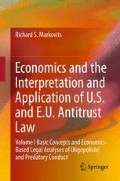Abstract
The Welfare Economics of Antitrust Policy and U.S. and E.U. Antitrust Law will list the various narrowly-defined categories of economic inefficiency whose magnitudes both business conduct and antitrust policies can affect that I find useful to distinguish and will explain how such conduct and policies can and when they will increase and decrease each of these narrowly-defined categories of economic inefficiency. This chapter is much less ambitious. Section 1 delineates four broad categories and a few subcategories of economic inefficiency (resource misallocation) whose magnitudes business conduct and antitrust policies can affect. Section 2 lists the various categories of economic-efficiency gains and losses that business conduct can yield whose generation by any exemplar of business conduct is irrelevant to the conduct’s antitrust legality and explains why these economic-efficiency effects are irrelevant to the legality of the conduct that generates them under U.S. antitrust law and E.C. competition law. And Sect. 3 lists the various categories of economic-efficiency gains that business conduct can yield whose generation is either directly or indirectly relevant to its antitrust legality and explains briefly why the fact that conduct yields these categories of economic-efficiency gains does favor its legality under the U.S. Sherman Act, the U.S. Clayton Act, Article 101 of the 2009 Lisbon Treaty, Article 102 of the 2009 Lisbon Treaty, and the EMCR.
Access this chapter
Tax calculation will be finalised at checkout
Purchases are for personal use only
Notes
- 1.
As I indicated in Chap. 4, the fact that the “technical progress” that an agreement might generate might be economically inefficient makes me reluctant to include as a possibly-justifying consequence of an agreement its tendency to increase the amount of resources its participants devote to PPR or technologically-or-commercially-innovative QV-investment creation (though this interpretation is favored by the fact that now-Article 101(3) refers to “technical or economic progress” [emphasis added]).
Author information
Authors and Affiliations
Rights and permissions
Copyright information
© 2014 Springer-Verlag Berlin Heidelberg
About this chapter
Cite this chapter
Markovits, R.S. (2014). Chapter 5 Categories of Economic-Efficiency Gains That Are and Are Not Relevant to Conduct’s Antitrust Legality. In: Economics and the Interpretation and Application of U.S. and E.U. Antitrust Law. Springer, Berlin, Heidelberg. https://doi.org/10.1007/978-3-642-24307-3_5
Download citation
DOI: https://doi.org/10.1007/978-3-642-24307-3_5
Published:
Publisher Name: Springer, Berlin, Heidelberg
Print ISBN: 978-3-642-24306-6
Online ISBN: 978-3-642-24307-3
eBook Packages: Business and EconomicsEconomics and Finance (R0)

